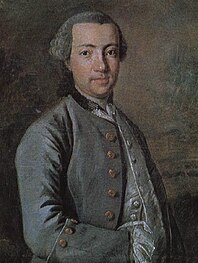Peter Forsskål
| Peter Forsskål | |
|---|---|
 |
|
| Born | 11 January 1732 Helsinki, Finland |
| Died | 11 July 1763 (aged 31) Yemen |
| Nationality | Swedish |
| Fields | exploration, orientalism and natural history |
| Author abbrev. (botany) | Forssk. |
Peter Forsskål, sometimes spelled Pehr Forsskål, Peter Forskaol, Petrus Forskål or Pehr Forsskåhl, (11 January 1732 – 11 July 1763) was a Swedish explorer, orientalist, naturalist and an apostle of Carl Linnaeus.
Forsskål was born in Helsinki in Finland (then a part of Sweden) where his father, Johannes Forsskål, served as a clergyman at the time, but came to mainland Sweden in 1741 when the father received the parish of in Uppland (and the archdiocese of Uppsala). As was common at the time, he enrolled at Uppsala University at a young age in 1742, but returned home for some time and, after studies on his own, rematriculated in Uppsala in 1751, where he completed a theological degree the same year.
In Uppsala he was one of the students of Linnaeus, but apparently also studied with the orientalist Carl Aurivillius, whose contacts with the Göttingen orientalist Johann David Michaelis are probably the reason why Forsskål travelled to the University of Göttingen in 1753; he studied Oriental languages and Philosophy and completed a doctorate there with a dissertation entitled Dubia de principiis philosophiae recentioris (1756). Returning to Uppsala in 1756, he wanted to pursue studies in Economics. In November 1759 he published a political pamphlet called, in Swedish, Tankar om borgerliga friheten (Thoughts on civil liberty). As it advocated complete freedom of print, it was at the time controversial and was consequently suppressed by the authorities on the day of publication. 'The pamphlet was censored by the "Hat" government and caused him to be warned by the Royal Chancellery.
On Michaelis' recommendation, and with Linnaeus's approval, Forsskål the next year (1760) was appointed by king Frederick V of Denmark to join, amongst others, the orientalist and mathematician Carsten Niebuhr on an expedition to Arabia. The group first went to Egypt where they stayed for about a year, with Forsskål pursuing studies in Arabic dialects, and arrived in South Arabia (Arabia Felix, present-day Yemen) at the end of December 1762. Just 31 years old, Forsskål worked hard on collecting botanical and zoological specimens, but fell ill with malaria and died in July 1763.
...
Wikipedia
